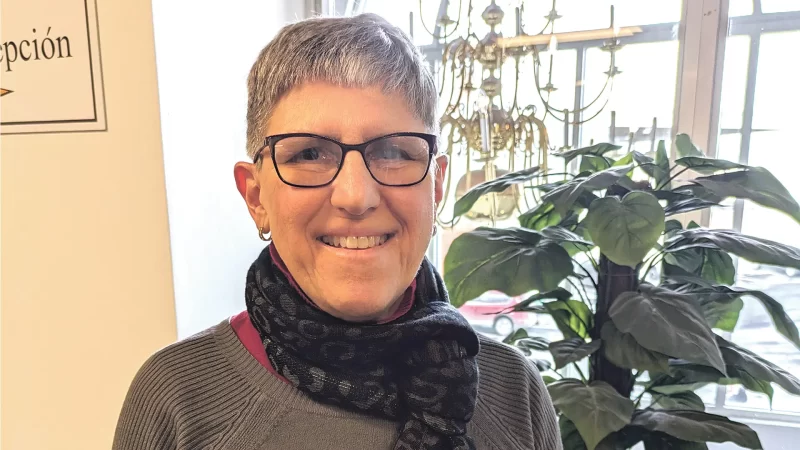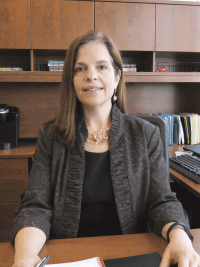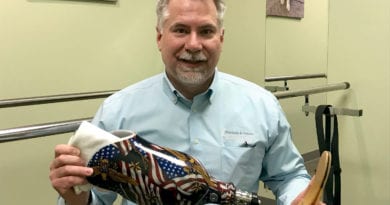WestMass ElderCare Evolves Mission, Rebrands to Access Care Partners
More Than a Name Change

As WestMass ElderCare celebrated its 50th anniversary last year, its leaders decided a new name was in order for the next 50.
“We really wanted to look at where are we today as opposed to where we started, why are we doing what we’re doing, and what the community understands about us,” Executive Director Roseann Martoccia said of the effort that led to a new brand and strategy, under the name Access Care Partners.
“It was a process of talking internally and then talking with community partners, as well as having some focus groups, so we could better understand not only how people know about us, but what’s important to them, particularly caregivers,” she explained. “What are they looking for when they’re up at night, searching on the internet or thinking about, ‘how am I going to help mom when I have to go to work and I have to do all these other things?’ What’s important to them?”
Partnering with Davis Advertising of Worcester, WestMass ElderCare conducted one-on-one interviews, online surveys, and focus groups involving around 200 community members, as well as internal staff, to gather input on how the organization is perceived and how it can continue to meet the needs of the community.
“The agency had rebranded in the early ’90s, and ‘ElderCare’ is the term that they came to, which at the time made a lot of sense,” Martoccia said. “But if someone is 68 or 75 or … well, pick an age, do they want to be called a senior? Do they want to be called an elderly person? ‘Older adult’ seems to be what people want to be called. Also, the people in the community that we serve include children, adults, and older adults.”
The name Access Care Partners better reflects the organization’s mission of providing care and support to people of all ages and abilities, ensuring they have access to the services they need to live independently, noted Sarah Aasheim, the organization’s director of Community Programs, who broke each word down for BusinessWest.
“It’s not one-size-fits-all. Some people have chronic health conditions, other people have memory loss, other people have behavioral-health issues, or a combination of these things. So every situation is a little bit different, and we start by meeting people where they are, and then go from there.”
“We landed on Partners because one consistent bit of feedback we got from everyone we talked to was that the older adults that we serve, the people with disabilities that we serve, don’t want someone doing things for them; they’d like a partner to do something alongside. They want to have agency and choice in the decisions that impact them,” she noted.
“Access was also a common denominator because, no matter who you’re serving, whether it’s an older adult, a caregiver, or someone who’s younger, we’re trying to make things simpler for them,” she went on. “And Care is just integral to who we are. That was one carryover from our previous name.”
With about 200 full-time staff, in addition to around 40 part-time Meals on Wheels drivers, the rebranding process was an exercise in helping the entire team reflect and refocus on their roles and how they fit into the whole, Aasheim added.

(Photo courtesy of Access Care Partners)
“You come into work, and you’re focused on ‘what do I have to do today? What is my role?’ But sometimes it’s good for all of us to lift up our heads and think, ‘oh, this is something else that’s happening,’ or ‘maybe this is within our scope as well, and we should have this integration and collaborative approach.’
In addition, Martoccia noted, when talking about clients, “it’s not one-size-fits-all. Some people have chronic health conditions, other people have memory loss, other people have behavioral-health issues, or a combination of these things. So every situation is a little bit different, and we start by meeting people where they are, and then go from there.”
Foundational Values
The services to meet those needs at Access Care Partners run the gamut from home care, adult family care, and personal care management to nutrition services, care coordination, benefits counseling, money management, behavioral health, housing services, and many more.
“Some of the things that we were founded on and started with are still with us today — services like Meals on Wheels, for example,” Martoccia said. “Our foundational values are still with us, which are to help people be independent in the community, with both the services we provide and supports that they get elsewhere — because we can’t do everything for everybody.
“And that speaks to how we interface with families and caregivers as well, because they can’t do everything, right?” she went on. “Yes, you live with someone, you do a lot for them, but you have to go out, you have to go work, you have to take care of your other business. Oftentimes, we can be a gap-filling support or peace of mind.”
The initial mission 50 years ago, which obviously continues today, is to work with older adults and caregivers, Martoccia explained, but over the years, that has expanded to working with younger people with disabilities. “It’s really the same — supporting people who want to be independent, supporting people who have some needs, and complementing the support and care they already have in their own lives.”
“Even before this recent change in the administration at the federal level and the potential impacts of that, we’ve recognized that we have to diversify our revenue sources and think about how to get a footprint in the private fundraising space.”
When clients are referred to Access Care Partners — from a hospital stay, by a rehabilitation facility, by family members, or through other means — the process to access services begins with a conversation around what they need, be it in-home care, helping with personal care, helping with household tasks and errands, or any number of other things, she noted.
“Money management is a great example of one of our programs that contributes to the mission of allowing people to stay at home,” Aasheim added. “We have a money-management director who provides supervision and support to a team of volunteers who support consumers in a couple of different ways.”
For example, “we have bill-payer clients, folks who might just need someone to visit them once or twice a month to make sure that their bills are getting paid, make sure their checks are coming in — providing the kind of support that a family member would provide,” she further explained. “That’s a game changer for a lot of people who otherwise might need a higher level of care and couldn’t stay in their own home. But with that level of support, it allows them to.”
There’s also a higher level of care called a representative payee program.
“These are folks who get a letter from their doctor basically saying that they have difficulty with capacity to manage their finances, so that authorizes the Social Security Administration to send their Social Security checks to us. We are the representative payees for those consumers, and we pay their bills directly,” Aasheim said. “When these individuals don’t have the sort of community or family support to help them with those things, it can really impair their ability to stay independent in their own home.”

The nutrition program is another example of a safety-net service that allows people to live independently.
“Sometimes it’s the only meal that our consumers who get home-delivered meals eat each day,” she noted. “So it ensures a certain level of nutrition, but at the same time, the delivery driver might be the only person that someone will see every day, too. For a caregiver, it’s immense peace of mind to know that someone’s going to lay eyes on mom or dad and make sure that they’re OK, they’re upright, they’re operating in their environment normally.
“Drivers get to know their consumers, and they notice subtle changes in their behaviors,” she added. “So that service offers, again, not just nutrition delivery, but really a safety check for those individuals to make sure that they’re OK. And if they’re not OK, that prompts a phone call back to our team here, followed by our case management.”
Sometimes, Martoccia said, the most important part of the process is the initial call from a caregiver who is overwhelmed and trying to understand their options.
“We’re not the answer for everyone, but we do connect people with other resources in the community. Maybe they have the resources to move to a different housing setting or pay for some services on their own, but they’re not sure where to start and how to get that ball rolling.
“Generally, when people come to us, they do have some chronic, ongoing conditions, but that’s not true in all cases. Sometimes it’s short-term,” she added. “But more often than not, it’s a longer term. There are many people receiving our services who would otherwise be in a nursing home.”
Time of Uncertainty
While clients and caregivers contribute to the cost of services, Access Care Partners also works with the Executive Office of Aging & Independence on state appropriations and MassHealth coverage, and works with third-party insurers as well.
But the new regime in Washington, D.C. — which so far has taken an aggressive approach to cost cutting and scaling back services in many areas of public life — has the organization’s leaders cautiously watching how that activity may eventually affect state funding, even though direct federal money accounts for just 10% of its revenue stream.
“Even before this recent change in the administration at the federal level and the potential impacts of that, we’ve recognized that we have to diversify our revenue sources and think about how to get a footprint in the private fundraising space. So we’ve invested here in the last couple of years in more capacity to do marketing and fundraising,” Aasheim said.
“We’re really just beginning that journey, but part of the education that we need to do in rolling out our new brand is to develop a partnership with the private philanthropic community to say, ‘we need support from the community to be able to continue to do what we’re doing.’ We don’t want to be in a situation where we’re having to take wait lists to deliver Meals on Wheels. But with the public funding crises that we may face, it may come to that.
“For people who are on a fixed income, the last few years have not been easy, and they’re not getting any easier,” Aasheim continued. “We help with health-related social needs in many ways and bring services into the home and into the community, but we’re not paying people’s food bills, their utility bills, their basics, their gasoline. This is something that, as a community, we’re all feeling, but it’s really playing out with people who are not in the workforce any longer and are living on a fixed income.”
Which is why the support services offered by Access Care Partners are so important, Martoccia said.
“Massachusetts has quite robust public and community-based systems, not only for our clientele, but across the board,” she told BusinessWest. “But as everyone is watching the federal landscape, we don’t know how that’s going to impact state appropriations in the future, and the rules. There’s a lot of integration between our state — any state — and the federal government. So as one thing shifts, we don’t know how things are going to play out. I think we’re just being cautious and watching every day to see what happens.”




